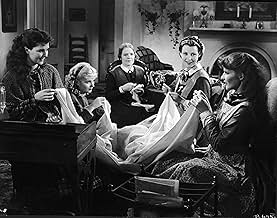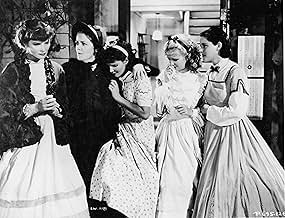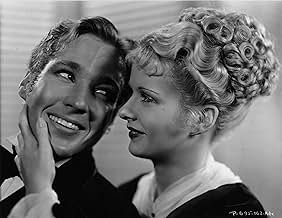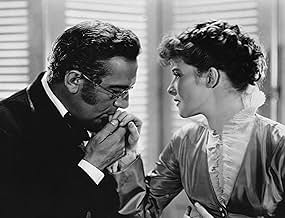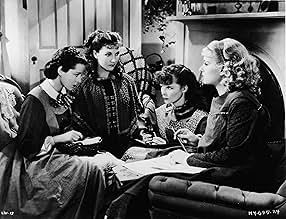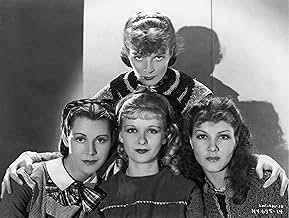IMDb RATING
7.1/10
8.4K
YOUR RATING
A chronicle of the lives of sisters growing up in 19th-century New England.A chronicle of the lives of sisters growing up in 19th-century New England.A chronicle of the lives of sisters growing up in 19th-century New England.
- Won 1 Oscar
- 7 wins & 4 nominations total
John Lodge
- Brooke
- (as John Davis Lodge)
Samuel S. Hinds
- Mr. March
- (as Samuel Hinds)
Nina Borget
- Housekeeper
- (uncredited)
Francesca Braggiotti
- Dance Teacher
- (uncredited)
Luke Cosgrave
- Old Man
- (uncredited)
Featured reviews
It's always a wonderful feeling when a film works its wonders on you. LITTLE WOMEN had that effect on me, and I'm not even a fan of these types of stories. This adaptation of the Louisa May Alcott classic has real heart, warmth, and the right amount of sentimentality, amounting to a wonderful film. Katharine Hepburn stars as the tomboyish Jo, a free-spirited young lady who is dying for adventure but craves the time she spends with her sisters. The one that stands out among the four is Beth, a caring, sweet girl with a flair for the piano. If you don't get teary-eyed about her cause, you definitely pass for a curmudgeon. The only complaint I have about this gem is that the last quarter of the film doesn't seem to have the matching effervescence that the rest of the film had. It ends abruptly and off-balance. All qualms aside, this is a genuine classic, filled with great performances and characters you can't help but like. A true family entertainment. Rating: Three stars and a half.
Having grown up with the Technicolor version of the 40s with a young Liz Taylor and a perky June Allyson, I was pleased to find this was just as good a version, better in many ways. Katharine Hepburn, as you might expect, is wonderful as the tomboy Jo March, who finds responsibility after a lifetime of woe for the family. Other cast stand-outs include Edna May Oliver as Aunt March. Laurie is a bit of a wet fish though. Both early versions are much, much better than the Winona Ryder one of the 90s, which was a sentimental Hollywood nostalgia trip which just didn't work. I'm still split between the two early ones but this is a definite favourite and I'd highly recommend it.
Few would deny the powerful presence of Katherine Hepburn in any movie she ever made. In this first screen adaptation with sound of Louisa May Alcott's famous novel, Hepburn IS the movie. That is to say, her part, her lines, her camera time seem to surpass the combined times of all the rest of the cast. While that may be as one would expect for many stories – a star or hero being the focal point of a whole work, this film, based on this book, was supposed to be about several "little women." So, most of the rest of the characters in the film – save a neighbor male friend, really get short shrift. For that reason, and a few others I'll mention, I think this rendition falls short of the interesting story told in the book.
I would like to have seen more development of the sisters than this film has. The later remake – 1949's MGM production, does flesh out all the characters more. The problem with the overly heavy emphasis on the one character in this first movie is that the audience doesn't get much of a sense of who are the rest of the members of the family. So we can't so readily experience the ups and downs, the emotions, the tragedy and love felt between the sisters and their mother.
Hepburn does a very good Jo, but not great. I think her efforts to be the tomboy were overdone in a few instances, which only drew my attention to this aspect of her role. She didn't seem to come by it naturally. One example was when she spoke a couple of times, acting and deliberately mimicking a deep-throated guttural voice for a man. At other times, she seemed to push it a bit and overact in flamboyance of tom-boyish behavior.
There were no other notable performances by other cast members. Paul Lukas as Professor Bhaer and Douglas Montgomery as Laurie were good. Most of the rest were just OK or non-descript. One member was just not right for the role of Marmee. Spring Byington brought no depth or real feel to the role that the viewer could sense. But, then, the film just seemed to glide over the lesser roles.
"Little Women" is a good story in the American library, and this film is enjoyable to watch. But, for a much more involving and endearing film, be sure to see the 1949 rendition by MGM.
I would like to have seen more development of the sisters than this film has. The later remake – 1949's MGM production, does flesh out all the characters more. The problem with the overly heavy emphasis on the one character in this first movie is that the audience doesn't get much of a sense of who are the rest of the members of the family. So we can't so readily experience the ups and downs, the emotions, the tragedy and love felt between the sisters and their mother.
Hepburn does a very good Jo, but not great. I think her efforts to be the tomboy were overdone in a few instances, which only drew my attention to this aspect of her role. She didn't seem to come by it naturally. One example was when she spoke a couple of times, acting and deliberately mimicking a deep-throated guttural voice for a man. At other times, she seemed to push it a bit and overact in flamboyance of tom-boyish behavior.
There were no other notable performances by other cast members. Paul Lukas as Professor Bhaer and Douglas Montgomery as Laurie were good. Most of the rest were just OK or non-descript. One member was just not right for the role of Marmee. Spring Byington brought no depth or real feel to the role that the viewer could sense. But, then, the film just seemed to glide over the lesser roles.
"Little Women" is a good story in the American library, and this film is enjoyable to watch. But, for a much more involving and endearing film, be sure to see the 1949 rendition by MGM.
The film might be more accurately titled "Little Woman", with Katherine Hepburn seizing the lead role, and never letting go. Otherwise, it's the story of four "Little Women" growing up, and finding love's direction. Hepburn (she's Jo) is sister to Joan Bennett (she's Amy), Jean Parker (she's Beth), and Frances Dee (she's Meg). Of their suitors, Douglass Montgomery (he's Laurie) gets the most action.
Ms. Bennett steals the actual acting honors with a performance that is natural and consistent; her voice and mannerisms are appropriately girlish, young womanish and, selfish. Ms. Hepburn plays girlish like she's had too many cups of coffee; additionally, she never looks even remotely "tomboyish"; looking, instead, like a ravishingly made-up MGM movie star. Ms. Parker rises out of her sick bed like a zombie, but is okay in other scenes.
Watching Hepburn being romanced by Mr. Montgomery and Paul Lukas is unnerving. The story does have some reasons to watch, however. The production is obviously top-of-the-line. Hepburn may not be in her best role, but it's not awful; she slows down and gets better after her character grows older. The script has well-written characters - Jo, Amy, and Laurie - who illustrate a sweet story of family, love, and friendship.
******* Little Women (11/16/33) George Cukor ~ Katharine Hepburn, Joan Bennett, Douglass Montgomery, Paul Lukas
Ms. Bennett steals the actual acting honors with a performance that is natural and consistent; her voice and mannerisms are appropriately girlish, young womanish and, selfish. Ms. Hepburn plays girlish like she's had too many cups of coffee; additionally, she never looks even remotely "tomboyish"; looking, instead, like a ravishingly made-up MGM movie star. Ms. Parker rises out of her sick bed like a zombie, but is okay in other scenes.
Watching Hepburn being romanced by Mr. Montgomery and Paul Lukas is unnerving. The story does have some reasons to watch, however. The production is obviously top-of-the-line. Hepburn may not be in her best role, but it's not awful; she slows down and gets better after her character grows older. The script has well-written characters - Jo, Amy, and Laurie - who illustrate a sweet story of family, love, and friendship.
******* Little Women (11/16/33) George Cukor ~ Katharine Hepburn, Joan Bennett, Douglass Montgomery, Paul Lukas
I'm probably not the target audience for this movie, so take my review with a grain of salt. I've also never read Louis May Alcott's novel, so I can't speak to how good an adaptation this is. But as a stand alone movie, George Cukor's 1933 version of this classic story is just too saccharine to bear.
To modern audiences, Katharine Hepburn is obviously the draw, and this was one of two movies released in 1933 -- the other, "Morning Glory," featuring the first of her record four Oscars -- that vaulted her to stardom. It's easy to see why -- her fiery, take no prisoners screen presence immediately places anyone else she happens to be in a scene with under her shadow. But Cukor would have done well to reign her in a bit in this film. Her Jo is a frantic, spastic creation at first, and Hepburn's performance is all over the place when trying to portray her as a young woman on the cusp of adulthood. As Jo matures, Hepburn settles down and her performance becomes more assured. But even without that, the story is just so maudlin and sentimental, and all the characters so goody goody, that I don't think a better lead performance would have made the movie any more enjoyable for me.
"Little Women" won the Oscar for Best Writing-Adaptation at the 1932-33 Academy Awards, and it also won nominations for Best Picture and Best Director (Cukor). Bit of Oscar trivia: 1932-33 was the last year the Academy split the award year over different calendar years. Beginning with the 1934 awards, the eligibility period would run from January 1 through December 31 as it does now. But in order to correct the schedule, the 1932-33 eligibility period ran from August 1 of 1932 through December 31 of 1933, meaning a whopping 16 months worth of films were eligible, the only time in Oscar history when an eligibility period was longer than 12 months.
Grade: B-
To modern audiences, Katharine Hepburn is obviously the draw, and this was one of two movies released in 1933 -- the other, "Morning Glory," featuring the first of her record four Oscars -- that vaulted her to stardom. It's easy to see why -- her fiery, take no prisoners screen presence immediately places anyone else she happens to be in a scene with under her shadow. But Cukor would have done well to reign her in a bit in this film. Her Jo is a frantic, spastic creation at first, and Hepburn's performance is all over the place when trying to portray her as a young woman on the cusp of adulthood. As Jo matures, Hepburn settles down and her performance becomes more assured. But even without that, the story is just so maudlin and sentimental, and all the characters so goody goody, that I don't think a better lead performance would have made the movie any more enjoyable for me.
"Little Women" won the Oscar for Best Writing-Adaptation at the 1932-33 Academy Awards, and it also won nominations for Best Picture and Best Director (Cukor). Bit of Oscar trivia: 1932-33 was the last year the Academy split the award year over different calendar years. Beginning with the 1934 awards, the eligibility period would run from January 1 through December 31 as it does now. But in order to correct the schedule, the 1932-33 eligibility period ran from August 1 of 1932 through December 31 of 1933, meaning a whopping 16 months worth of films were eligible, the only time in Oscar history when an eligibility period was longer than 12 months.
Grade: B-
Did you know
- TriviaKatharine Hepburn asked costume designer Walter Plunkett to copy a dress her maternal grandmother wore in a tintype photograph.
- GoofsIn the Christmas play when the prop tower falls down, Jo's lips aren't moving when she says "Everything is all right."
- Quotes
Beth March: You're old enough now to leave off boyish tricks and behave better, Josephine. Now you are so tall and turn up your hair, you must remember you're a young lady.
Jo March: No, l'm not. And if turning up my hair makes me so, l'll wear it down till l'm a hundred!
- Crazy creditsPaul Lukas as Professor Bher is not listed in the closing credits.
- Alternate versionsOlder video and television prints remove the original RKO logo in the opening and replace it with the one from Selznick International.
- ConnectionsFeatured in David O. Selznick: 'Your New Producer' (1935)
- SoundtracksThe Girl I Left Behind Me
(uncredited)
Traditional
Played during the opening scene
Details
- Release date
- Country of origin
- Languages
- Also known as
- Las cuatro hermanitas
- Filming locations
- Providencia Ranch, Hollywood Hills, Los Angeles, California, USA(exterior of March house)
- Production company
- See more company credits at IMDbPro
Box office
- Budget
- $424,000 (estimated)
- Runtime
- 1h 55m(115 min)
- Aspect ratio
- 1.37 : 1
Contribute to this page
Suggest an edit or add missing content


